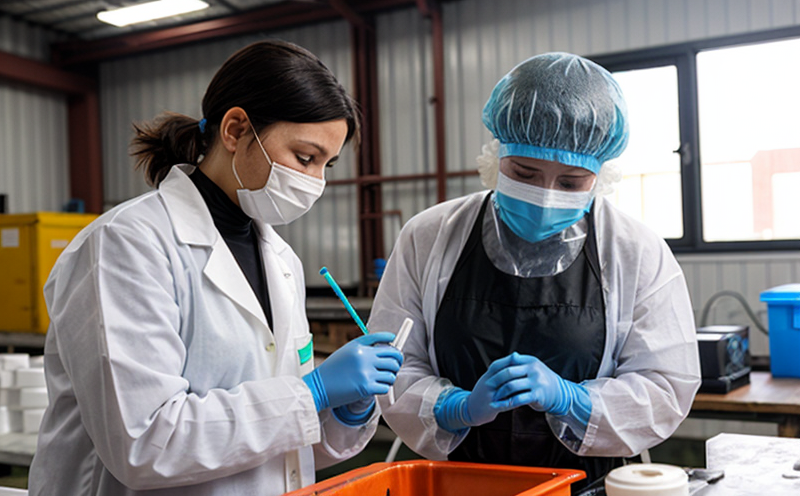ISO 20502 Scratch Resistance of Recycled Nanocoatings
The ISO 20502 standard is pivotal in ensuring the durability and quality of recycled nanomaterials. This standard specifically addresses the scratch resistance of these materials, which are increasingly sought after for their environmental sustainability and performance characteristics.
Recycled nanomaterials derived from waste streams offer a sustainable alternative to traditional raw materials. However, their durability remains a critical factor in determining their market viability and reliability. ISO 20502 provides a standardized method to assess the scratch resistance of these nanocoatings, ensuring that they can withstand real-world conditions without degradation.
The test procedure outlined in this standard involves subjecting specimens to controlled scratching using various abrasive materials under specified conditions. The aim is to evaluate how well the nanomaterials resist damage and maintain their integrity over time. This assessment is crucial for industries such as electronics, automotive, and construction, where surface durability can significantly impact product performance.
The process typically involves preparing specimens according to specific dimensions defined in ISO 20502. These samples are then subjected to a series of scratch tests using standardized abrasive materials under controlled environmental conditions. The depth and extent of the scratches are carefully measured and recorded, providing quantitative data on the scratch resistance of the nanocoatings.
By adhering to this standard, manufacturers can ensure that their recycled nanomaterials meet stringent quality benchmarks, thereby enhancing customer confidence and market competitiveness. This standard is particularly important for R&D engineers and quality managers who are responsible for ensuring product integrity and compliance with international regulations.
- Enhanced Durability: Ensures prolonged performance of products in demanding environments.
- Sustainability: Promotes the use of recycled materials, reducing environmental impact.
- Innovation: Encourages continuous improvement and development of sustainable nanomaterials.
- Consistency: Provides a uniform method for testing across different manufacturers and regions.
The implementation of ISO 20502 not only supports the growth of recycled nanotechnology but also fosters innovation in green technologies. It ensures that products made from these materials meet international quality standards, thereby paving the way for broader adoption and integration into various sectors.
Why It Matters
The scratch resistance assessment outlined in ISO 20502 is crucial for several reasons. Firstly, it ensures that recycled nanocoatings can withstand the harsh conditions they are likely to encounter during their lifecycle. This durability is critical for products like electronic devices and automotive components, where surface integrity directly affects performance.
Secondly, this standard promotes sustainability by encouraging the use of recycled materials in manufacturing processes. By ensuring that these materials meet stringent quality benchmarks, ISO 20502 supports the transition towards more sustainable production methods. This is particularly important as industries seek to reduce their carbon footprint and environmental impact.
The standard also plays a key role in fostering innovation within the nanotechnology sector. By providing a standardized method for testing, it encourages manufacturers to develop new materials and coatings that meet or exceed these standards. This can lead to the development of more efficient and sustainable products.
Finally, ISO 20502 ensures consistency across different manufacturers and regions. With a standardized methodology, testers in various parts of the world can conduct comparable tests, ensuring that the results are reliable and repeatable. This consistency is essential for regulatory compliance and market acceptance.
Applied Standards
The ISO 20502 standard is widely recognized as a key document in the field of nanomaterials testing. It is part of a broader suite of standards that address various aspects of recycled materials, including their chemical and physical properties.
This standard specifically focuses on the scratch resistance of nanocoatings derived from recycled materials. The methodology involves controlled scratching tests to evaluate how well these coatings can resist damage under specified conditions. The results provide quantitative data on the durability of the nanocoatings, which is critical for ensuring product performance and reliability.
The application of this standard extends beyond mere compliance; it also supports research and development efforts in the field of recycled nanomaterials. By providing a reliable method for testing, ISO 20502 enables scientists and engineers to innovate more effectively, leading to the development of new materials with enhanced properties.
The standard is applicable across various industries, including electronics, automotive, and construction. In these sectors, surface durability can significantly impact product performance and longevity. By adhering to ISO 20502, manufacturers can ensure that their products meet international quality benchmarks, thereby enhancing customer confidence and market competitiveness.





